九年级英语上册第一单元知识点
九年级英语上册第一单元笔记

九年级英语上册第一单元笔记一、重点单词。
1. textbook.- 词性:名词,意为“教科书;课本”。
例如:We need to buy a new English textbook.(我们需要买一本新的英语课本。
)2. conversation.- 词性:名词,“交谈;谈话”。
短语“have a conversation with sb.”表示“与某人交谈”,如:I had a great conversation with my teacher yesterday.(我昨天和我的老师进行了一次很棒的交谈。
)3. aloud.- 词性:副词,“大声地;出声地”。
区别于“loud”(形容词,可作副词,侧重声音响亮)和“loudly”(副词,侧重喧闹地)。
例如:Read the text aloud.(大声朗读课文。
)4. pronunciation.- 词性:名词,“发音;读音”。
例如:His pronunciation is very good.(他的发音很好。
)5. sentence.- 词性:名词,“句子”。
例如:Make a sentence with this word.(用这个词造一个句子。
)6. patient.- 词性:- 形容词,“有耐心的”,be patient with sb.表示“对某人有耐心”,如:Our teacher is patient with us.(我们的老师对我们很有耐心。
)- 名词,“病人”,例如:The doctor has many patients every day.(这位医生每天有很多病人。
)7. expression.- 词性:名词,“表达(方式);表示;表情”。
例如:His facial expression shows that he is happy.(他的面部表情表明他很开心。
)8. discover.- 词性:动词,“发现;发觉”。
九年级英语上册重要知识点总结

九年级英语上册重要知识点总结Document serial number【NL89WT-NY98YT-NC8CB-NNUUT-NUT108】九年级英语上册第一单元重要知识点总结九年级英语上册第一单元重要知识点总结Unit1一、知识点:在旅馆的登记入住。
ut:在旅馆结账离开。
2.By:①通过…..方式(途径)。
例:IlearnEnglishbylisteningtotapes.②在…..旁边。
例:bythewindow/thedoor③乘坐交通工具例:bybus/car④在……之前,到……为止。
例:byOctober在10月前⑤被例:Englbymanypeople.3.how与what的区别:how通常对方式或程度提问,意思有:怎么样如何,通常用来做状语、表语。
what通常对动作的发出者或接受者提问,意思为什么,通常做宾语,主语。
①Howisyoursummerholiday?It’sOK.(how表示程度做表语)②Howdi dyoutravelaroundtheworld?Itravelbyair.③Whatdoyoulearnatschool?IlearnEnglish,mathandma ubjects.①What……?How…like…?②What…dowith…?How…dealwith…?③What…likeabout…?How…like…?④What’stheweatherliketoday?How’stheweathertod ay?⑤Whattodo?Howtodoit?e.g.Whatdoyoubook?=Howdoyoulbook?Idon’tknowwhatIshoulddowatter.=Idon’tknowhowIs houlddealwWhatdoyoulikeaboutChina?=Howdoyoula?Idon’tknowwhattodonextstep?=Idon’tknowhowtodoi tnextstep?㊣Whatgood/badweaday!(weather为不可数名词,其前不能加a)㊣Whatafine/baddaday!(day为可数名词,其前要加a)4.aloud,loud与loudly的用法:三个词都与"大声"或"响亮"有关。
九上英语unit1知识点总结

九上unit1知识点总结一、重点短语:1、eat up 吃完,吃光2、be curious about 对…感到好奇3、keep…in order 使…保持井然有序4、show off 炫耀5、come up with 想出(主意)6、n either…nor… 既不…也不…7、impress sb with sth 用…给某人留下印象8、win high praise 赢得高度赞扬9、sales department 销售部10、general manager总经理11、in general 总的来说12、e ither…or… 不是…就是… 13、take the lead 处于领先地位14、fall behind 落后15、take on new challenges迎接新的挑战16、chief engineer总工程师17、the high-speed railway高铁18、connect to/with与…连接19、as good as 和…几乎一样简直是20、pay attention to 注意21、work to high standards以高标准工作22、a pioneer heart surgeon 心脏外科先锋23、work extra hours 加班几个小时24、be suitable for… 适合于…25、b e impatient with… 对…没有耐心26、think twice(about sth) 三思而行27、do the dishes 洗碗28、lunar calendar 阴历,农历29、animal sign 生肖30、in all 总共,总计31、star sign 星座32、d ivide…into… 把…分成…33、make a speech 发表演讲34、be absent from… 缺席…35、agree with sb/ agree to do sth 同意某人看法/ 同意做某事36、all day long 一整天37、search for 搜寻38、be easy to work with容易共事39、can’t be too…再…也不为过40、n ot only…but (also)…不仅…而且…41、I t is said that… 据说42、t hat’s not the case事实并非如此二、重要用法总结:1、create (v.)创造-----creative(adj.) 有创造力的energy(n.)能量、能源-----energetic(adj.)精力充沛的organize (v.)组织---organized (adj.)有条理的--organization (n.)组织born (adj.) 天生的-----birth (n.) 出生careful (adj.)细心的-----careless (adj.)粗心-----carelessness (n.)粗心patient(adj.)有耐心的-----(反义词)impatient没有耐心的2、pay attention to doing sth 注意做某事3、devot sth to sth/doing sth 把…贡献于…/致力于做某事4、without doing sth 没有做某事5、give up doing sth 放弃做某事6、start/begin to do sth , start/begin doing sth 开始做某事7、be ready to do sth准备做某事be willing to do sth 乐意做某事8、can’t afford to do sth负担不起做某事三、重点语法:1、并列连词and 、but 、or、so①and表示并列关系,译为“和,又”(在否定句中并列成分通常用or连接,而不用and)②but表示转折关系,译为“但是”,所连接的成分意思往往相反或相对。
九年级英语上册各单元知识点归纳

九年级英语上册各单元知识点归纳第一单元:基础知识1. 介词短语的使用:介词短语是由一个介词和它的宾语组成的短语,用来表示时间、地点、方向、原因等。
例如:"on the table"(在桌子上),"in the park"(在公园里)。
介词短语在句子中作状语、定语、宾语等。
需要注意介词与宾语之间的搭配。
2. 动词的时态和语态:英语中的动词有多种时态和语态。
常见的时态有一般现在时、一般过去时、一般将来时等。
常见的语态有主动语态和被动语态。
时态用于表示动作发生的时间,语态用于表示动作的执行者。
例如:"She is reading a book."(她正在读一本书)。
需要注意时态和语态的用法和变化规则。
3. 名词的单复数形式:英语中的名词有单数和复数形式。
复数形式一般是在名词后面加-s或-es。
有些名词的复数形式较特殊,需要记忆。
例如:"a cat"(一只猫)的复数形式是"cats"(多只猫)。
需要注意名词的单复数形式在句子中的搭配和用法。
第二单元:阅读理解1. 完型填空:完型填空是一种考察学生对语境理解和词汇运用能力的题型。
在完型填空中,通常给出一篇文章和一些空格,要求学生根据文章内容和语境选择正确的单词或短语填入空格中。
通常需要结合文章整体逻辑和上下文意义来填写正确答案。
2. 阅读理解题:阅读理解题是一种考察学生阅读理解能力和推理能力的题型。
通常会给出一篇短文或文章,然后根据文章内容提出一些问题,要求学生根据文章内容和推理来回答问题。
需要学会熟练阅读和理解文章,抓住关键信息和主题,并能运用推理等能力来回答问题。
第三单元:语法知识1. 直接引语和间接引语:在英语中,当我们引述别人的话时,可以使用直接引语和间接引语。
直接引语是直接引用别人所说的话,使用引号将其包围;间接引语是将别人所说的话转述出来。
例如:直接引语:"I am happy," she said.(她说:“我很开心。
人教版初三英语第一单元知识点
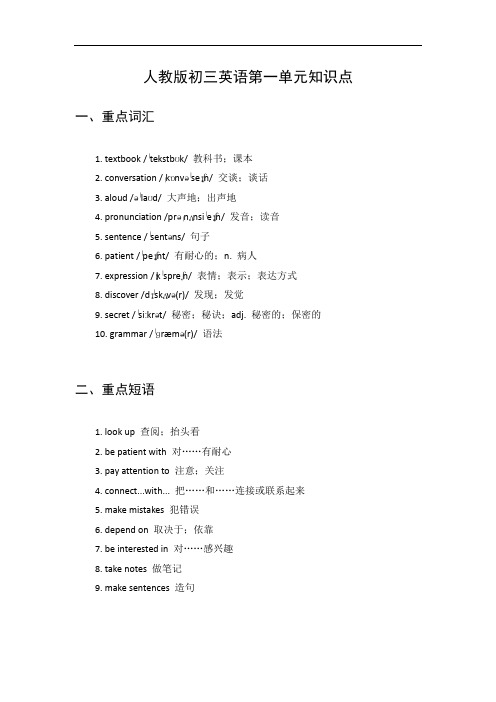
人教版初三英语第一单元知识点一、重点词汇1. textbook /ˈtekstbʊk/ 教科书;课本2. conversation /ˌkɒnvəˈseɪʃn/ 交谈;谈话3. aloud /əˈlaʊd/ 大声地;出声地4. pronunciation /prəˌnʌnsiˈeɪʃn/ 发音;读音5. sentence /ˈsentəns/ 句子6. patient /ˈpeɪʃnt/ 有耐心的;n. 病人7. expression /ɪkˈspreʃn/ 表情;表示;表达方式8. discover /dɪˈskʌvə(r)/ 发现;发觉9. secret /ˈsiːkrət/ 秘密;秘诀;adj. 秘密的;保密的10. grammar /ˈɡræmə(r)/ 语法二、重点短语1. look up 查阅;抬头看2. be patient with 对……有耐心3. pay attention to 注意;关注4. connect...with... 把……和……连接或联系起来5. make mistakes 犯错误6. depend on 取决于;依靠7. be interested in 对……感兴趣8. take notes 做笔记9. make sentences 造句三、重点句型1. —How do you study for a test? 你是怎样为考试而学习的?—I study by working with a group. 我通过和小组一起学习。
2. It's too hard to understand spoken English. 听懂英语口语太难了。
3. The more you read, the faster you'll be. 你读得越多,你就会读得越快。
4. Why did Wei Fen find it difficult to learn English? 为什么魏芬觉得学英语很难?5. I was afraid to ask questions because of my poor pronunciation. 因为我的发音不好,我害怕问问题。
(完整版)九年级英语上册第一单元知识点总结

九年级英语上册第一单元知识点总结九年级英语上册第一单元知识点总结Unit 1一、知识点: 在旅馆的登记入住。
ut: 在旅馆结账离开。
2.By: ①通过…..方式(途径)。
例:I learn English by listening to tapes.②在…..旁边。
例:by the window/the door③乘坐交通工具例:by bus/car④在……之前,到……为止。
例:by October在10月前⑤被例:Englby many people.3.how与what的区别:how通常对方式或程度提问,意思有:怎么样如何,通常用来做状语、表语。
what通常对动作的发出者或接受者提问,意思为什么,通常做宾语,主语。
①How is your summer holiday? It’s OK.(how表示程度做表语)②How did you travel around the world? I travel by air.③What do you learn at school? I learn English, math and maubjects.① What……? How…like…?② What…do with…? How…deal with…?③ What…like about…? How…like…?④ What’s the weather like today? How’s the weather today?⑤ What to do? How to do it?e.g. What do youbook?=How do you lbook?I don’t know what I should do watter.=I don’t know how I should deal wWhat do you like about China?=How do you la?I don’t know what to do next step?=I don’t know how to do it next step?㊣ What good / bad weaday!(weather为不可数名词,其前不能加 a )㊣ What a fine / bad daday! (day为可数名词,其前要加 a )4. aloud, loud与loudly的用法 : 三个词都与"大声"或"响亮"有关。
新目标英语九年级上第一单元知识点汇总
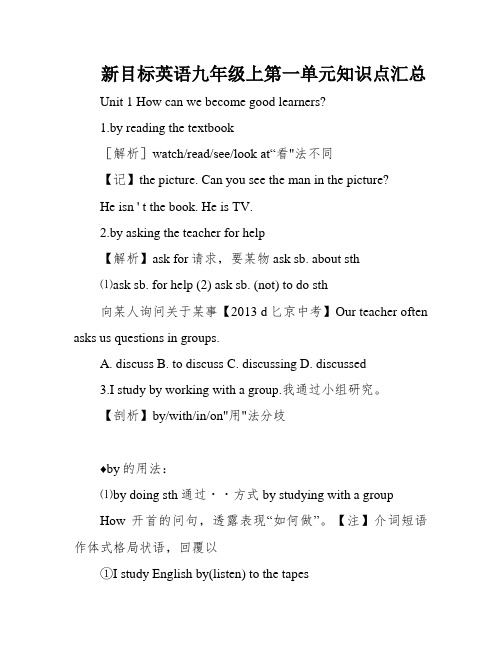
新目标英语九年级上第一单元知识点汇总Unit 1 How can we become good learners?1.by reading the textbook[解析]watch/read/see/look at“看"法不同【记】the picture. Can you see the man in the picture?He isn ' t the book. He is TV.2.by asking the teacher for help【解析】ask for请求,要某物ask sb. about sth⑴ask sb. for help (2) ask sb. (not) to do sth向某人询问关于某事【2013 d匕京中考】Our teacher often asks us questions in groups.A. discussB. to discussC. discussingD. discussed3.I study by working with a group.我通过小组研究。
【剖析】by/with/in/on"用"法分歧♦by的用法:⑴by doing sth通过・・方式by studying with a groupHow开首的问句,透露表现“如何做”。
【注】介词短语作体式格局状语,回覆以①I study English by(listen) to the tapes②Tom learns Chinese by(watch) Chinese movies.③--did you get there?- By a taxi.A. How; takingB. How ; takeC. How; tookD. What; taking(2) by+交通工具(交通工具前不能加限定词)♦with的用法:表示用某种工具⑴with +工具We like to write with a pen.(2)with+eyes.♦in的用法:平日与“穿着、声音、誊写资料”等称号连用in+语言in English用英语speak in a soft voice♦on的用法:on +电器或序言on TV /radio/Internet()The boy was cutting a branch of a tree a knife.A. inB. byC. withD. use4.Do you learn English by watching videos?by bike by train人体部位We see with our【解析】learn—learned/learnt—learned/learnt v研究learn about相识(1)learn from sb.(2)learn to do sth向某人研究学着做某事(3)learn…by oneself= teach oneself自学⑴aloud adv“出声",指出声能让人听见,但声音不大read aloud大声朗读(2) loud adj./adv作副词时,常与speak, talk, laugh等连用。
九年级上册英语第一单元知识点

九年级上册英语第一单元知识点九年级上册的英语教材第一单元主要介绍了一些基础的语法知识和词汇,本文将对这些知识点进行详细的讲解和总结。
一、动词的时态1.一般现在时:表示经常性或习惯性的动作,结构为主语+动词原形。
例如:I often play basketball.2.一般过去时:表示过去某个时间发生的动作,结构为主语+动词的过去式。
例如:He watched a movie last night.3.一般将来时:表示将来要发生的动作,结构为主语+will+动词原形。
例如:We will go shopping tomorrow.二、名词的复数形式1.一般情况下,名词复数形式在词尾加-s。
例如:book-books,cat-cats.2.以-s、-sh、-ch、-x结尾的名词,在词尾加-es。
例如:bus-buses,brush-brushes.3.以辅音字母+y结尾的名词,变y为i,再加-es。
例如:party-parties,city-cities.4.以-o结尾的名词,有时在词尾加-es,有时只加-s。
例如:photo-photos,piano-pianos.三、形容词的比较级和最高级1.比较级的构成:原级+er。
例如:big-bigger,slow-slower.2.最高级的构成:原级+est。
例如:big-biggest,slow-slowest.3.部分形容词的比较级和最高级形式不规则,需要特殊记忆。
例如:good-better-best,bad-worse-worst.四、副词的用法副词用来修饰动词、形容词和其他副词,常放在句子的中间或末尾。
例如:She sings beautifully.一些常见的副词有:well,quickly,carefully,sometimes等。
五、连词的使用1.并列连词:用来连接并列的词或短语,常见的有and,but,or等。
例如:I like apples and oranges.2.转折连词:用来引导转折关系的句子,常见的有however,although,but等。
九年级上册英语1到5单元知识点

九年级上册英语1到5单元知识点总结1. Unit 1: Best friends- Vocabulary: friendship,panion, trust, support- Grammar: present continuous tense, possessive pronouns - Topic: The importance of friendship and how to be a good friend2. Unit 2: English around the world- Vocabulary: bilingual, dialect, accent, globalization- Grammar:parative and superlative adjectives, adverbs of frequency- Topic: The influence of English as a global language and its variations in different countries3. Unit 3: Travel journal- Vocabulary: destination, itinerary, amodation, excursion- Grammar: past simple tense, past continuous tense- Topic: Sharing travel experiences, discussing favorite destinations, and describing past trips4. Unit 4: Great inventions- Vocabulary: innovation, breakthrough, patent, prototype- Grammar: reported speech, passive voice- Topic: Exploring the impact of inventions on society and discussing the process of innovation5. Unit 5: Health and well-being- Vocabulary: nutrition, fitness, well-being, hygiene- Grammar: modal verbs, conditional sentences- Topic: Promoting a healthy lifestyle, discussing the importance of exercise and balanced dietBased on the above knowledge points, it is clear that the ninth-grade English curriculum covers a wide range of topics from interpersonal relationships to globalmunication, from personal experiences to technological advancements, and from physical health to overall well-being. As a language, English not only serves as a means ofmunication but also provides insights into various aspects of life and society.In Unit 1, the focus on friendship highlights the importance of building and maintaining meaningful relationships. The vocabulary related to friendship emphasizes qualities such as trust and support, while the grammar lessons on present continuous tense and possessive pronouns enable students toexpress their thoughts and emotions more accurately. By incorporating these language elements into discussions about friendship, students are able to deepen their understanding of the topic and express themselves more fluently.Moving on to Unit 2, the exploration of English as a global language introduces students to the diversity of language and culture. The vocabulary related to bilingualism and globalization sheds light on the influence of English in different contexts, while the grammar lessons onparative and superlative adjectives provide a framework forparing and contrasting languages. Through discussions on language variations and the impact of globalization, students gain insights into the interconnectedness of the world and the importance of cultural exchange.In Unit 3, the travel journal serves as a platform for students to share their experiences and broaden their perspectives. The vocabulary related to travel and the grammar lessons on past tenses enable students to narrate their past experiences and plan future trips. By engaging in discussions about favorite destinations and travel itineraries, students not only enhance their language skills but also develop a sense of curiosity andadventure.Unit 4 delves into the realm of innovation and invention, offering students a glimpse into the world of creativity and problem-solving. The vocabulary related to innovation and the grammar lessons on reported speech and passive voice provide students with the tools to discuss technological advancements and their impact on society. Through debates on the pros and cons of various inventions, students develop critical thinking skills and an appreciation for human ingenuity.Finally, in Unit 5, the focus on health and well-being encourages students to reflect on their lifestyle choices and habits. The vocabulary related to nutrition and fitness,bined with the grammar lessons on modal verbs and conditional sentences, empowers students to advocate for a healthy lifestyle and express their concerns about public health issues. By engaging in conversations about the importance of exercise and balanced diet, students not only improve their language proficiency but also cultivate a sense of responsibility towards themselves and others.In conclusion, the ninth-grade English curriculum offers a richtapestry of topics that not only enhance language skills but also foster personal growth and broadened perspectives. By incorporating vocabulary, grammar, and topics that are relevant to students' lives, the curriculum provides an engaging and meaningful learning experience.As a writer, I personally find the integration of language learning with real-life topics to be highly effective in stimulating students' interest and fostering a holistic understanding of the English language. Furthermore, the emphasis onmunication skills and critical thinking in the curriculum equips students with the tools to navigate a rapidly changing world, both linguistically and intellectually.In summary, the ninth-grade English curriculum, with its diverse range of topics and language elements, not only prepares students for linguistic proficiency but also nurtures their intellectual curiosity and global awareness. Through the exploration of friendship, globalmunication, travel experiences, technological advancements, and health consciousness, students are not only equipped with language skills but also empowered to navigate theplexities of the modern world. This holistic approach to language learning is essential in nurturingwell-rounded individuals who are capable of engaging with the world in a meaningful and impactful manner.。
新人教版九年级上册英语第一单元必考知识点归纳
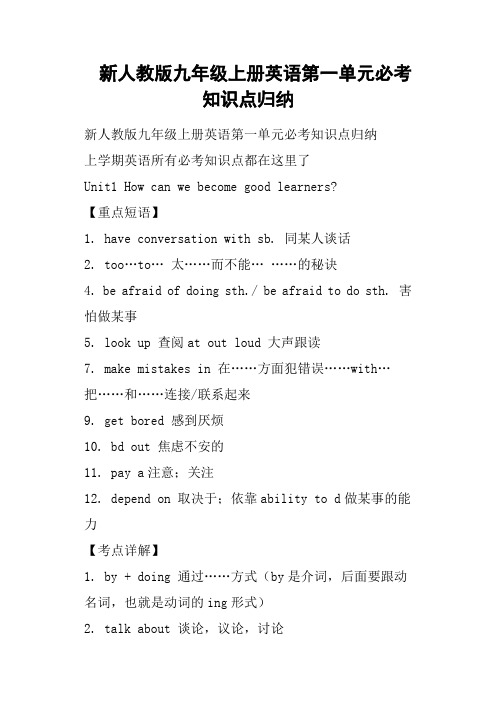
新人教版九年级上册英语第一单元必考知识点归纳新人教版九年级上册英语第一单元必考知识点归纳上学期英语所有必考知识点都在这里了Unit1 How can we become good learners?【重点短语】1. have conversation with sb. 同某人谈话2. too…to… 太……而不能… ……的秘诀4. be afraid of doing sth./ be afraid to do sth. 害怕做某事5. look up 查阅at out loud 大声跟读7. make mistakes in 在……方面犯错误……with… 把……和……连接/联系起来9. get bored 感到厌烦10. bd out 焦虑不安的11. pay a注意;关注12. depend on 取决于;依靠ability to d做某事的能力【考点详解】1. by + doing 通过……方式(by是介词,后面要跟动名词,也就是动词的ing形式)2. talk about 谈论,议论,讨论The studalk about movie after class. 学生们常常在课后讨论电影。
talk to sb= talk with sb 与某人说话3. 提建议的句子:①What/ how about +doing sth.? 做…怎么样?(about 后面要用动词的ing形式,这一点考试考的比较多)如:What/ How about goingg?②Why don't you + do sth.? 你为什么不做…?如:Why don't you gg?③Why not + do sth. ? 为什么不做…?如:Why not gg?④Let's + do sth. 让我们做…...吧。
如: Let's gg⑤Shall we/I + do sth.? 我们/我...…好吗?如:Shall we/I gg?4. a lot 许多,常用于句末。
九年级英语第一单元知识点归纳总结

九年级英语第一单元知识点归纳总结一、重点词汇1、 textbook n 教科书;课本2、 conversation n 交谈;谈话3、 aloud adv 大声地;出声地4、 pronunciation n 发音;读音5、 sentence n 句子6、 patient adj 有耐心的 n 病人7、 expression n 表情;表示;表达方式8、 discover v 发现;发觉9、 secret n 秘密;秘诀 adj 秘密的;保密的10、 grammar n 语法11、 repeat v 重复;重做12、 note n 笔记;记录 v 注意;指出13、 pal n 朋友;伙伴14、 physics n 物理;物理学15、 chemistry n 化学二、重点短语1、 work with friends 和朋友一起学习2、 make word cards 制作单词卡片3、 read aloud 大声朗读4、 practice conversations with 与练习对话5、 improve speaking skills 提高口语技能6、 give a report 作报告7、 at first 起初;起先8、 word by word 逐词地9、 be patient 有耐心10、 the secret to 的秘诀11、 because of 因为12、 fall in love with 爱上13、 look up 查阅;抬头看14、 take notes 做笔记15、 keep a diary 写日记三、重点句型1、 How do you study for a test? 你是怎样为考试而学习的?2、 I study by working with a group 我通过小组合作来学习。
3、 It's too hard to understand spoken English 英语口语太难懂了。
九年级上册英语第一单元知识点

九年级上册英语第一单元知识点第一单元是九年级上册英语的开篇单元,主要介绍了一些基础的英语知识点。
下面是对该单元的知识点进行详细解析。
1. 重点词汇和短语在这一单元中,我们需要掌握一些重要的词汇和短语。
例如:- greet:问候- introduce:介绍- classmate:同学- subject:科目- foreign:外国的- born:出生- age:年龄- nationality:国籍- speak:说话- speak English:说英语- surprise:惊讶- lucky:幸运的- guess:猜这些词汇和短语在日常英语中经常使用,掌握它们有助于提高我们的英语交流能力。
2. 问候和自我介绍这一单元还涉及到如何进行问候和自我介绍。
例如,我们学习了一些常用的问候语,如:- How are you?:你好吗?- Good morning/afternoon/evening:早上/下午/晚上好- Nice to meet you:很高兴见到你在自我介绍方面,我们需要能够介绍自己的名字、年龄、国籍等信息。
例如:- My name is Tom.:我的名字叫汤姆。
- I'm thirteen years old.:我今年十三岁。
- I'm from China.:我来自中国。
通过学习这些知识点,我们可以在日常生活中更加自如地与他人交流。
3. 数字和年龄在这一单元中,我们还需要掌握数字和年龄的表达方式。
例如,我们需要学习1-20的英文表达形式:- one:一- two:二- three:三- ...- twenty:二十此外,我们还需要学会询问他人的年龄以及回答这个问题。
例如:- How old are you?:你几岁了?- I'm fifteen years old.:我十五岁。
数字和年龄是我们生活中经常用到的概念,掌握它们对我们的英语学习非常重要。
4. 国籍和语言在这个单元,我们还学习了如何询问他人的国籍以及使用的语言。
人教版九年级英语unit1知识点
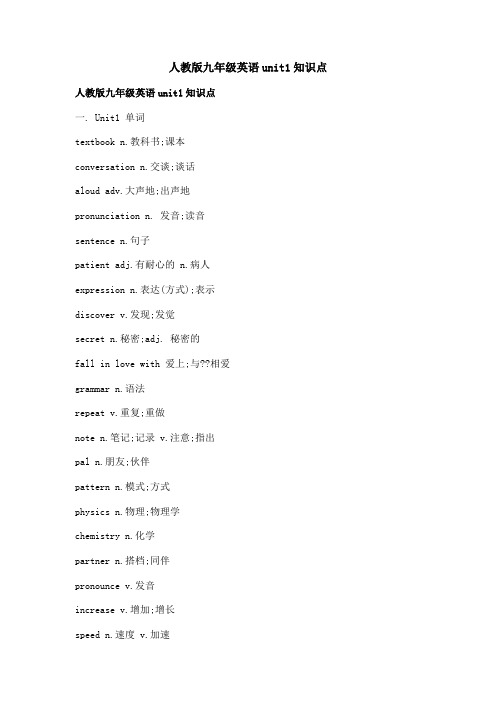
人教版九年级英语unit1知识点人教版九年级英语unit1知识点一. Unit1 单词textbook n.教科书;课本conversation n.交谈;谈话aloud adv.大声地;出声地pronunciation n. 发音;读音sentence n.句子patient adj.有耐心的 n.病人expression n.表达(方式);表示discover v.发现;发觉secret n.秘密;adj. 秘密的fall in love with 爱上;与??相爱grammar n.语法repeat v.重复;重做note n.笔记;记录 v.注意;指出pal n.朋友;伙伴pattern n.模式;方式physics n.物理;物理学chemistry n.化学partner n.搭档;同伴pronounce v.发音increase v.增加;增长speed n.速度 v.加速ability n.能力;才能brain n.大脑active adj.活跃的;积极的attention n.注意;关注pay attention to 注意;关注connect v.(使)连接;与??有联系connect…with... 把??和??连接或联系起来overnight adv.一夜之间;在夜间review v.& n.回顾;复习knowledge n.知识;学问wisely adv.明智地;聪明地Annie 安妮(女名)Alexander Graham Bell 格雷厄姆 ? 贝尔二.Unit1知识梳理Unit 1 How can we become good learners?重点短语1. good learners 优秀的学习者2. work with friends 和朋友一起学习3. study for a test 备考4.have conversations with 与……交谈5.speaking skills 口语技巧6.a little 有点儿7.at first 起初起先8.the secret to... .......的秘诀9.because of 因为10.as well 也11.look up 查阅;抬头看12.so that 以便,为了13.the meaning of ……的意思14.make mistakes 犯错误15.talk to 交谈16.depend on 依靠依赖17.in common 共有的18.pay attention to 注意关注19. connect …with …把……联系20.for example 例如21.think about 考虑22.even if 即使尽管纵容23.look for 寻找24.worry about 担心担忧25.make word cards 制作单词卡片26.ask the teacher for help 向老师求助27.read aloud 大声读28.spoken English 英语口语29.give a report 作报告30.word by word 一字一字地31. so……that 如此……以至于32.fall in love with 爱上33.something interesting 有趣的事情34.take notes 记笔记35.how often 多久一次36.a lot of 许多37.the ability to do sth. 做某事的能力38.learning habits 学习习惯39.be interested in 对……感兴趣40.get bored 感到无聊重点句型1.提建议的句子:①What/ how about +doing sth.? 做…怎么样?如:What/ How about going shopping?②Why don't you + do sth.? 你为什么不做…?如:Why don't you go s hopping?③Why not + do sth. ? 为什么不做…?如:Why not go shopping?④Let's + do sth. 让我们做…吧。
九年级英语上册第一单元重要知识点总结

九年级英语上册第一单元重要知识点总结九年级英语上册第一单元重要知识点总结Unit 1一、知识点: 在旅馆的登记入住。
ut: 在旅馆结账离开。
2.By: ①通过…..方式(途径)。
例:I learn English by listening to tapes.②在…..旁边。
例:by the window/the door③乘坐交通工具例:by bus/car④在……之前,到……为止。
例:by October在10月前⑤被例:Englby many people.3.how与what的区别:how通常对方式或程度提问,意思有:怎么样如何,通常用来做状语、表语。
what通常对动作的发出者或接受者提问,意思为什么,通常做宾语,主语。
①How is your summer holiday? It’s OK.(how表示程度做表语)②How did you travel around the world? I travel by air.③What do you learn at school? I learn En glish, math and maubjects.① What……? How…like…?② What…do with…? How…deal with…?③ What…like about…? How…like…?④ What’s the weather like today? How’s the weather today?⑤ What to do? How to do it?e.g. What do youbook?=How do you lbook?I do n’t know what I should do watter.=I don’t know how I should deal w What do you like aboutChina?=How do you la?I don’t know what to do next step?=I don’t know how to do it next step?㊣What good / bad weaday!(weather为不可数名词,其前不能加 a )㊣What a fine / bad daday! (day为可数名词,其前要加 a )4. aloud, loud与loudly的用法: 三个词都与"大声"或"响亮"有关。
九年级上册英语第一单元知识点
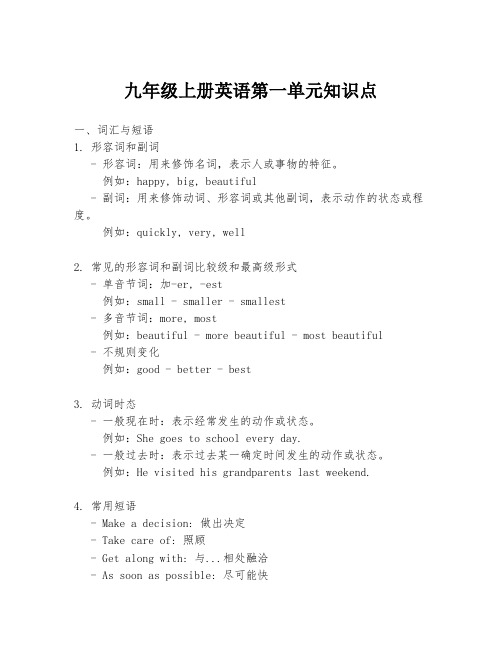
九年级上册英语第一单元知识点一、词汇与短语1. 形容词和副词- 形容词:用来修饰名词,表示人或事物的特征。
例如:happy, big, beautiful- 副词:用来修饰动词、形容词或其他副词,表示动作的状态或程度。
例如:quickly, very, well2. 常见的形容词和副词比较级和最高级形式- 单音节词:加-er, -est例如:small - smaller - smallest- 多音节词:more, most例如:beautiful - more beautiful - most beautiful- 不规则变化例如:good - better - best3. 动词时态- 一般现在时:表示经常发生的动作或状态。
例如:She goes to school every day.- 一般过去时:表示过去某一确定时间发生的动作或状态。
例如:He visited his grandparents last weekend.4. 常用短语- Make a decision: 做出决定- Take care of: 照顾- Get along with: 与...相处融洽- As soon as possible: 尽可能快二、语法点1. 比较级和最高级的构成- 规则变化:形容词和副词的比较级和最高级通常是通过在词尾加上-er和-est构成。
- 不规则变化:一些形容词和副词的比较级和最高级形式是不规则的,需要特别记忆。
- 双重比较级:使用more和less来构成比较级和最高级,适用于多音节和一些单音节形容词。
2. 比较级和最高级的用法- 比较级用于比较两者之间的差别。
例如:My sister is taller than me.- 最高级用于比较三者或三者以上的人或事物。
例如:Tom is the tallest student in our class.3. 时态的使用- 一般现在时通常用于描述习惯性动作或普遍真理。
九年级上册英语重点笔记

九年级上册英语重点笔记一、Unit 1 How can we become good learners?1. 重点单词。
- textbook(教科书;课本)- conversation(交谈;谈话),have a conversation with sb.(与某人交谈)- aloud(大声地;出声地),区别于loud(大声的,形容词,常用来修饰名词,如a loud voice)和loudly(大声地,副词,含有喧闹之意)。
- pronunciation(发音;读音)- sentence(句子)- patient(有耐心的;病人),be patient with sb.(对某人有耐心)- expression(表达(方式);表示)2. 重点短语。
- by doing sth.(通过做某事),例如:I learn English by reading English books.(我通过读英语书学习英语。
)- make mistakes(犯错误),make a mistake也可。
- look up(查阅;抬头看),通常指在词典等资料中查找信息,如look up the word in the dictionary(在词典里查这个单词)。
- take notes(做笔记)- be born with(天生具有),例如:He is born with a good memory.(他天生记忆力好。
)- pay attention to(注意;关注),to是介词,后面接名词、代词或动名词,如pay attention to your pronunciation(注意你的发音)。
3. 重点句型。
- What about doing sth.?(做某事怎么样?)用于提出建议,例如:What about listening to English songs?(听英语歌曲怎么样?)- How do you study for a test?(你如何为考试而学习?)- I study by working with a group.(我通过小组合作来学习。
九年级上册英语Unit1 知识点归纳整理
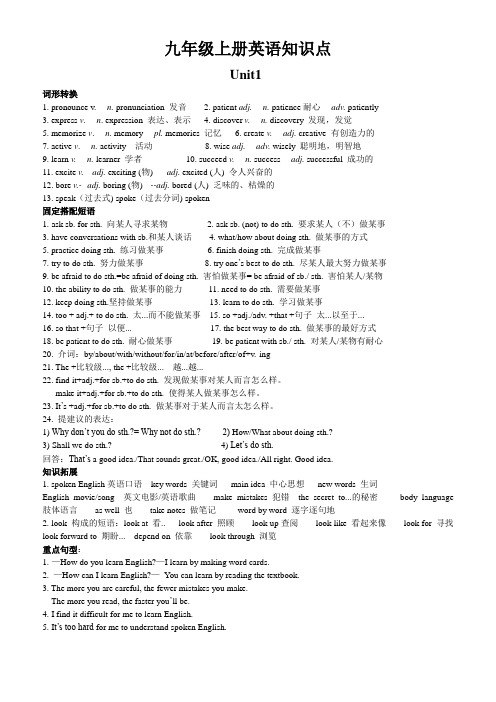
九年级上册英语知识点Unit1词形转换1. pronounce v.--- n. pronunciation 发音2. patient adj.--- n. patience耐心--- adv. patiently3. express v.--- n. expression 表达、表示4. discover v.--- n. discovery 发现,发觉5. memorize v.--- n. memory ---pl. memories 记忆6. create v.--- adj. creative 有创造力的7. active v.--- n. activity 活动8. wise adj.--- adv. wisely 聪明地,明智地9. learn v.--- n. learner 学者10. succeed v.--- n. success--- adj. successful 成功的11. excite v.---adj. exciting (物) ----adj. excited (人) 令人兴奋的12. bore v.---adj. boring (物) ----adj. bored (人) 乏味的、枯燥的13. speak(过去式) spoke(过去分词) spoken固定搭配短语1.ask sb. for sth. 向某人寻求某物2. ask sb. (not) to do sth. 要求某人(不)做某事3. have conversations with sb.和某人谈话4. what/how about doing sth. 做某事的方式5. practice doing sth. 练习做某事6. finish doing sth. 完成做某事7. try to do sth. 努力做某事8. try one’s best to do sth. 尽某人最大努力做某事9. be afraid to do sth.=be afraid of doing sth. 害怕做某事= be afraid of sb./ sth. 害怕某人/某物10. the ability to do sth. 做某事的能力11. need to do sth. 需要做某事12. keep doing sth.坚持做某事13. learn to do sth. 学习做某事14. too + adj.+ to do sth. 太...而不能做某事15. so +adj./adv. +that +句子太...以至于...16. so that +句子以便... 17. the best way to do sth. 做某事的最好方式18. be patient to do sth. 耐心做某事19. be patient with sb./ sth. 对某人/某物有耐心20. 介词:by/about/with/without/for/in/at/before/after/of+v.-ing21. The +比较级..., the +比较级... 越...越...22. find it+adj.+for sb.+to do sth. 发现做某事对某人而言怎么样。
九年级英语上册第一单元知识点汇总(一)

九年级英语上册第一单元知识点汇总(一)1.aloudadv.出声地ReadingaloudisagoodwayinleaningEnglish.朗读是学英语的一个好方法。
▲loudadj.大声的,声音洪亮的,loud—louder—loudestHetalkedinaloudvoicesothateveryonecouldhearhim.他说话声音很大以便于每个人都能听得到他。
▲adv.loud—louder—loudestDon’ttalksoloud.Thekidsarereading.说话小声些,孩子们正在看书。
louder,please!请再说高一些!▲loudlyadv吵吵闹闹地,噪声地Iheardsomeoneknockedloudlyatthedoor.我听到有人在使劲敲门。
Theyaretalkingloudlyinthenextroom.他们在隔壁说话声很大。
2.voicen.噪音,鸟鸣声Shehasasweetvoice.她声音很甜美。
Sheraisedhervoicesothatshecouldbeheard.她提高了嗓音队便于别人能听清楚。
Helosthisvoice./Hehadnovoicebecauseofthecough. 因为咳嗽,他失声了。
▲noisen噪音,吵闹Don’tmakesomuchnoise.别弄出那么大的噪音。
Iheardastrangenoiseoutside.我听到外边奇怪的声音。
▲soundn.声音,响声Soundtravelsslowerthanlight.声音的传播比光慢。
3.memoryn.储存器Alotofinformationisstoredinthememory.计算机的储存器能储存很多信息。
▲n.记忆力Hehasapoormemoryafterthecaraccident.车祸后他的记忆力很差了。
▲n.回忆,怀念Ihaveapleasantmemoryofmychildhood.我对童年有美好的回忆。
- 1、下载文档前请自行甄别文档内容的完整性,平台不提供额外的编辑、内容补充、找答案等附加服务。
- 2、"仅部分预览"的文档,不可在线预览部分如存在完整性等问题,可反馈申请退款(可完整预览的文档不适用该条件!)。
- 3、如文档侵犯您的权益,请联系客服反馈,我们会尽快为您处理(人工客服工作时间:9:00-18:30)。
九年级英语上册第一单元知识点
Unit 1 How can we become good learners? 短语总结:
1.have conversation with sb.同某人谈话
2.too…to…太……而不能
3.the secret to………的秘诀
4.be afraid of doing sth./be afraid to dosth.害怕做某事
5.look up查阅
6.make mistakes in在……方面犯错误
7.connect……with…把…和…连接/联系起来
8.get bored感到厌烦
9.be stressed out焦虑不安的
10.pay attention to注意;关注
11.depend on取决于;依靠
12.the ability to do sth..做某事的能力
二.用法集萃
1.by doing sth通过做某事
2.it+be+adj+to do sth做某事是……的
3.finish doing sth完成某事
4.what about doing sth?做某事怎么样?
5.try to do sth尽力做某事
6.the+比较近,the+比较近越……,就越……
7.find it+adj+to do sth发现做某事
8.be afraid of doing sth害怕做某事
9.help sb(to)do sth帮助某人做某事10.practice doing sth练习做某事11.keep doing sth一直做某事12.be afraid to do sth害怕做某事
13.begin to do sth开始做某事14.want to do sth想要做某事
15.need to do sth需要做某事16.remember to do sth记得做某事
17.shoot射(射着,射死等表结果)18.shoot at(瞄准)射。
